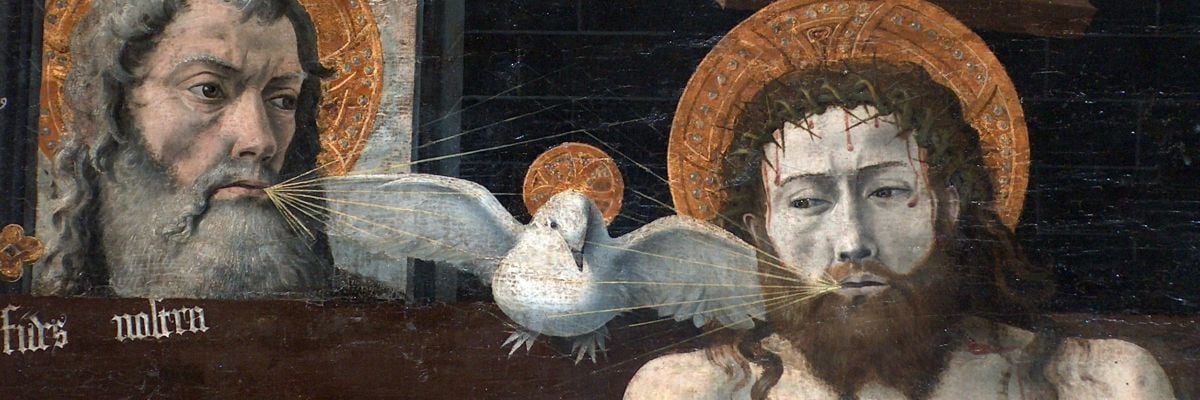
Karlo Broussard explains the Catholic position on the procession of the Holy Spirit from both the Father and the Son. He discusses the historical and theological basis for this belief, including references to the Catechism, St. Thomas Aquinas, and the Council of Florence. Discover why Catholics profess this in the Nicene Creed every Sunday.
Transcript:
Yuri wanted to know, what are the Catholic arguments for adding the filioque into the creed?
Yeah, fantastic question. And this is a big question, right? Because it’s at the heart of disagreements between Catholic and Orthodox Christians. So first of all, what does filioque mean? I think that’s important to get on the table for our listeners. It’s Latin for and the son. And it refers to the Holy Spirit proceeding from the father and the son, which we profess as Catholics every Sunday in the Nicene Creed. The Catechism of the Catholic Church gives a nice summary, a brief synopsis of this theological issue in paragraphs 246 to 248.
And as the Catechism points out, we believe that based on the dogmatic confession by Pope St. Leo I in AD 447, so in the mid 5th century there, in a document entitled, “Quam la de Bilitaire,” which means how praiseworthy. And it was later inserted into the creed with magisterial authority into the Latin liturgy between the eighth and 11th centuries as the Catechism points out. So we can appeal to magisterial authority as for a reason why we profess the Holy Spirit’s procession from the father and the son. And that’s consistent with our Catholic view of the Pope having that authority to declare it as such and for the church to permit it to be included within the Nicene Creed. Now, what are the theological arguments? Well, here’s one resource, Thomas, that was a fantastic episode. It’s episode 208 of the Classical Theism Podcast, hosted by my good friend, John DeRosa. He’s also an author of a book that we published through Catholic Answers Press. I think “One Less God Than You” is the title of it. And the title of the episode is, “The Trinity and Filioque with Father Thomas Joseph White, a Dominican priest, fantastic scholar.” And he does a great job providing all of the theological rationale behind it. And so that’s a resource for our listeners. But here’s what the Council of Florence states.
The Council of Florence in declaring the filioque, actually in the 15th century, that is, actually gave us a theological explanation. It stated, “Since the father has through generation given to the only begotten son, everything that belongs to the father, except being father, the son has also eternally from the father from whom he is eternally begotten, that the Holy Spirit proceeds from the son.” So notice the theological rationale here, Thomas, is that the son is and has everything that the father has and is, except being the one who begets, except being the father. And given that truth, it follows from that, that the procession of the Holy Spirit from the father would also belong to the son. And this is exactly what St. Thomas Aquinas, in the 13th century, argued prior to the Council of Florence in the first part of the Summa Theologiae, question 36, article four, he teaches the same thing. The Council of Florence was adopting St. Thomas’ argument there in its declaration.
He says, “The father and the son are in everything one, wherever there is no distinction between them of an opposite relation.” And so he goes on to say, “The same quote unquote spirative power belongs to the father and to the son.” And that’s what Florence was saying. “The procession of the Holy Spirit from the father that what is called a spirative power breathing forth of from the father belongs to the son as well.” Because again, the son and the father are one in everything except being father. And so here’s a brief summary of this theological argument. Whatever power the father has, the son has, that’s premise one, premise two, the Holy Spirit proceeds from the spirative power of the father. And so therefore the son has the spirative power of the father from which the Holy Spirit proceeds. And that’s St. Thomas’ Aquinas’ argument and an argument that was adopted by the Council of Florence and it makes sense to me and to many others.
Now, as far as the biblical exegesis or maybe a biblical defense of the Filioque, that is to say the procession of the Holy Spirit from both the father and the son, I would recommend our listeners to check out Tim Staples’ article at catholic.com, defending the Filioque where he goes into detail and appealing to passages like John 1526 and Revelation chapter 22 verse one and following where there is enough biblical data there to infer from it this procession of the Holy Spirit from both the father and the son.
Hey, thanks for watching. If you like this Catholic answer, be sure to like, subscribe and check out our live streams Monday through Friday, 3 to 5 p.m. Pacific or find the episode after on YouTube, your favorite podcast platform or our Catholic Answers app.



